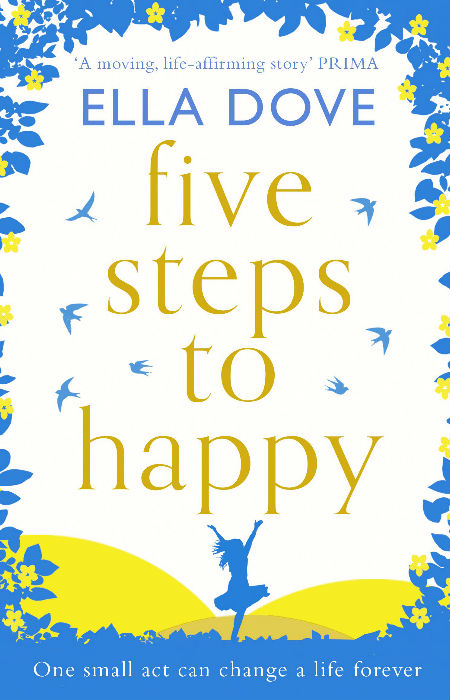
Life is full of surprises.
Many are wonderful – unexpected birthday parties, fantastic new job offers, kind words from a total stranger or close friend just when you need it the most.
But some are gut-wrenchingly life-changing, the kind that knock you to the ground so profoundly with rug-from-under-you fury that you honestly wonder if you’re capable of getting up again.
Five Steps to Happy by debut author Ella Dove, details what happens when a scenario very much, and unwelcomingly, of the latter kind makes its wholly destructive presence known in the hitherto-unremarkable life of bar worker/wannabe actor Heidi.
Out jogging one day like she has thousands of times before, Heidi trips and falls, in the process twisting her knee so badly that it cuts off blood supply to her lower leg, resulting in an amputation.
Quite apart from grappling with the loss of her right leg below the knee, which is a whole thing in and of itself, Heidi has to find a way to deal with the consequential guilt that comes in endless tsunamis as she watches how her injury affects not just her life but that of close friends and family.
“Arriving at the Amputee Rehabilitation Unit was not dissimilar to becoming an unwilling extra in a remake of One Flew Over the Cuckoo’s Nest – only with a lot more wheelchairs. As my dad pushed me out of the lift and onto the second-floor ward, I could see them lined up along the wall; looming, bulky contraptions of differing sizes, from the average model to the bariatric, which looked like it could fit three of me across its vast seat. It was a very depressing sight.” (P. 35)
Based on a real-life experience of the author, who lost her leg in similar circumstances as her protagonist – though she is at pains to point out in the book’s introduction that the vast majority of the book is not autobiographical in nature – Five Steps to Happy does a brilliant job of grounding something traumatic in terms that any one us can relate to.
That’s important because although we can likely conceive of how the loss of a limb would be a horrific thing to happen, not many of us could make the leap to how it must feel to have your life utterly derailed on a dya-to-day basis as a result.
From interrupting career plans (auditions foregone) to the sheer difficulty of getting around as a disabled person in a world lamentably still almost wholly geared to the abled to the sheer amount of time spent in rehabilitation, and much more, Dove brings her life-altering injury down into the everyday stuff of life.
It’s this willingness to not just canvas the sheer momentousness of such a life interruption but down it percolates down to everything from cooking, and public transport to getting around an apartment and holding down a job that gives Five Steps to Happy such an authentic sense of how an event of this magnitude can transform your life for the worse in ways you, naturally enough, never saw coming.
Deep-diving into Ella’s state of mind – the story is told in first-person from her point of view so we are privy to the many chaotic twists-and-turns that zigzag through her mind as she has to learn how to do life all over again – we come to appreciate how confronting her news status is and how drastically it affects her state of mind, emotional stability and overall sense of self.

But, and this is where the life-affirming part of things comes in, we are also privy to how Ella very slowly and with the expected two steps forward, five steps back approach, slowly but surely builds herself a new life, with the help of old friends like Dougie, her very supportive family (though her sister has issues for a while there) and new friends like fellow new amputee 82-year-old Maud and her grandson jack who may just be the new love interest Heidi needs to get her through.
Or is he?
In a book that sometimes feel a little stilted and cliched narratively and dialogue-wise, with characters who feel like they’re speaking lines in emotion-less monotone or in an histrionic melodramatic fashion, Dove succeeds brilliantly in not succumbing to the most obvious tropes.
The friends and family for instance are not the towering rocks of perfectly immovable support and emotional surety so beloved of Hollywood-esque stories of this type of story; they are there of course (well, most of them are – see below for the exception) but they are struggling in their own ways to come to terms with what’s happened to someone they love.
Dove beautifully explores what it must be like to watch helplessly as someone who was previously independent and in charge of her life has to go back to square one and start all over again.
As someone who has gone through this harrowing process from the point of view of the person who’s lost a limb, she is uniquely-placed to explore how one person’s injury can affect a village and how it then takes the village to get through to the other side, whatever that might look like.
“I tried to laugh along, but my voice sounded fake. These were my friends, so why did I feel like they were mocking me? Sure, they’d sent a card in hospital at the very beginning, but none of them had tried to visit. They were all thrilled to see me now, but their efforts had been lukewarm – where had they been when I needed friends the most? Not by my side.” (P. 195)
Romantically, what transpires between Jack and Heidi does not play out quite as you might expect.
No more will be said on that count since SPOILERS! but suffice to say, Dove neatly shifts the focus of the story so that Heidi’s story remains paramount and Five Steps to Happy stays very much about one woman’s determined march to reclaim her life on her terms in her own way.
While there are some issues with the book, which feels a little emotional whiplash-y for its own good at times, it is for the greater part an uplifting, life-affirming exploration of how life can throw us for the most horrific of loops and how coming back from the dark places such an event can take us to is by no means an easy, linear journey.
Five Steps to Happy is a delightful read, a book that is often brutally honest about dark and impossible life can seem at the very worst of times, but which also acknowledges that there is a road back to the light and that while it isn’t an easy one to travel, it is navigable, even if where we end up, for both better and worse, is nothing like where we might have expected to be.